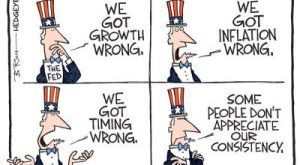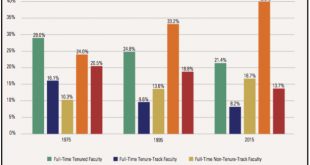from Lars Syll It takes some courage, maturity, and perception for the self-discovery that one is engaged in a fraudulent enterprise … Our teachers never talked about ideologies or the larger issues, and seemed content with discussing arcane mathematics — DELIBERATE deception involves knowing the truth and then using lies to hide it.This does not seem to be the modus operandi. Rather, after the initial discomfort of swallowing certain absurd framing ideas wears off, one learns to believe...
Read More »Notes on the firm
from Peter Radford When, for reasons too byzantine to recount here, I decided to re-engage with economics a couple of decades ago I did so through the prism of business. After all I had just finished a stint in banking and was thinking about the way in which the rise of digital technology would change the way in which business is conducted. The reason for this point of re-entry was that I believed then, and still do, that economies are movements of information as much as, if not more...
Read More »Trumponomics and social prosperity
from Robert Locke The management principles Trump evokes in Think Big and Kick Ass are those for self-enrichment reminiscent of robber barons during the Gilded Age. In his election campaign Trump promised to use his knowhow to restore prosperity to the dispossessed white middle class in rust belt communities. Will his management principles, if they served him and other billionaires well, do the same for the white middle class communities? This is a question economists seldom ask since...
Read More »Left behind
from David Ruccio Liberal stories about who’s been left behind during the Second Great Depression are just about as convincing as the “breathtakingly clunky” 2014 movie starring Nicolas Cage. For Thomas B. Edsall, the story is all about the people in the “rural, less populated regions of the country” who have been left behind in the “accelerated shift toward urban prosperity and exurban-to-rural stagnation” and who supported Republicans in the most recent election. Louis Hyman, for his...
Read More »Mainstream ‘pluralism’
from Lars Syll The only economic analysis that mainstream economists accept is the one that takes place within the analytic-formalistic modeling strategy that makes up the core of mainstream economics. All models and theories that do not live up to the precepts of the mainstream methodological canon are pruned. You’re free to take your models — not using (mathematical) models at all is considered totally unthinkable — and apply them to whatever you want — as long as you do it within the...
Read More »Why a global disaster that could easily have been prevented took place.
from Edward Fullbrook Steve Keen has a new book out: Can we avoid another financial crisis? Keen, as you probably know, was one of those economists – Nouriel Roubini, Dean Baker, Ann Pettifor, Michael Hudson, Wynne Godley and others – who warned well in advance that the Global Financial Crash was coming if preventive measures were not taken. How did these economists clearly see the crash coming when neoclassical economists did not, not even the day before it happened? Keen’s new book...
Read More »Realism in economics
from Maria Alejandra Madi A relevant feature of the current crisis in economic knowledge is the recurrence of the Ricardian Vice. Joseph A. Schumpeter coined this term in his book History of Economic Analysis when he criticized the habit assigned to Ricardo to represent the economy by a set of simplified assumptions and to use tautologies to develop practical economic solutions. Indeed, Schumpeter rejected the kind of economic thought that mainly favours deductive methods of inquiry –...
Read More »Easter Monday links. (Mis?)measurement
The ECB buys lots of bonds from large oil companies, not from small and medium enterprises. Rapid money supply growth does not cause inflation (measurements!) New UK guidelines on how to estimate natural capital. Surely worth the effort! But some things do not have a price for a good reason. And when you look really, really hard at statistics of the stock of capital it turns out that statisticians measure the value of rights to the monetary yield of ownership of certain items. And not any...
Read More »Economics — an empty and inexact science
from Lars Syll Of course economics involves cases where economists appear too reluctant to give up their favoured models. You can find similar stories in the hard sciences. There will be more such stories in economics because the inexact nature of economics makes it easier to discount any single piece of evidence. What I cannot understand is what leads someone … to argue against the use of evidence, and instead that “economics is primarily a way of organizing one’s thinking”. Astrology is...
Read More »Academic precariat
from David Ruccio As we know, the share of part-time faculty in U.S. higher education has increased dramatically over the past four decades. According to the latest report from the American Association of University Professors (pdf), Part-time faculty today comprise approximately 40 percent of the academic labor force, a slightly larger share than tenured and tenure-track faculty combined. While the category of part-time faculty includes professors temporarily teaching on a percentage...
Read More » Real-World Economics Review
Real-World Economics Review






